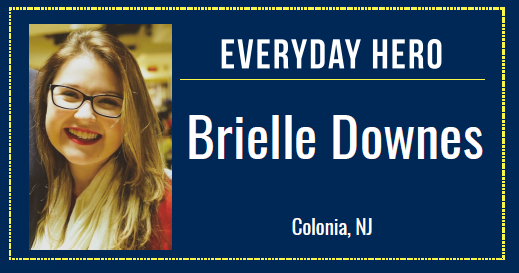Everyday Hero: Brielle Downes
Everyday Hero
Everyday Heroes is a monthly series recognizing individuals, families or businesses that go above and beyond to serve our local T1D community.

MEET BRIELLE DOWNES
This month’s Everyday Hero is Brielle Downes: a dance teacher, recreational therapy aide and a mentor to teens affected by type 1 diabetes (T1D). After being diagnosed at the age of 9, Brielle lived the first 8 years of her life rebelling against testing and treating at school because of embarrassment and bullying. Upon high school graduation, Brielle moved to Florida to attend college. The new environment was life-changing & freeing. For Brielle she was about to remove herself from the kids who bullied, made new friends who were supportive and got her health back on track.
She realized had she not taken charge of her life and diabetes, her health would have further declined from complications of the disease. Now, Brielle acts as mentor to at-risk teens who are going through similar experiences. She uses her story as a way to connect with teens, knowing what they are going though and helping to lead them on a different, healthier path.
We spoke with Brielle Downes to learn more about her story and inspiration.
JDRF: Tell us about yourself and your connection to T1D.
Brielle Downes: I am 23 years old I am studying to get my Bachelors in Therapeutic Recreation while also working as a recreation aide in a nursing and rehab facility and as a dance teacher. I am the oldest of 6 children, 3 sisters and 2 brothers. I was diagnosed with T1D in December 2002 at 9 years old and lived about the first 8 years almost completely non-compliant. After going to school and moving to another state, I was able to get my health back on track so that I am now able to mentor young at-risk teens and help them to not make the same mistakes that I did.
JDRF: Why did you decide to focus on mentoring at-risk teens in the T1D community?
Brielle Downes: I decided to focus on mentoring at-risk teens because I have been in their shoes and know what it’s like to feel so alone – like no one understands you.
Growing up, it was so easy to go out with friends, to the movies or the mall and grab a cup of coffee or a sweet snack, and want to keep walking without stopping to check my blood glucose. It felt embarrassing, especially with friends, when I had to stop, check my BG and take insulin. I know that when I had my back turned, I was missing out on conversations and inside jokes with friends – and they never wanted to repeat themselves, which left me feeling excluded. I have suffered through depression, bullying, and harassment during times when checking and giving insulin which deterred me from doing so. I want teens to know that they aren’t alone and that all of those things that they are insecure about when it comes to diabetes can be an empowering strength.
JDRF: What does a cure mean to you?
Brielle Downes: A cure to me means freedom to live my life without worry. I have my diabetes under control now, more than I ever have, but I still worry about highs and lows in the middle of the night. I still have to make sure I pack double of everything I need when I go away on vacation, and even then it might not be enough if something goes wrong. Insulin and supplies are expensive; a cure unburdens me of the cost just to live. A cure means everything to me because I want to be able to someday live my life without the constant worry.
For additional information on our Everyday Hero this month or to nominate someone for the Everyday Hero series, contact mford@jdrf.org.